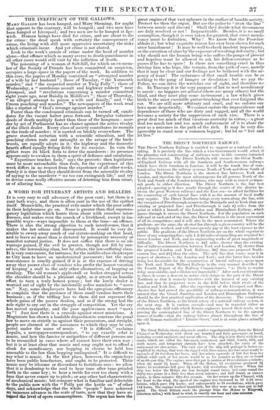A WORD FOR ITINERANT ARTISTS AND DEALERS.
IT is very easy to call advocacy- of the poor cant ; but there is a cant both ways, and there is often cant in the use of the epithet itself. Meanwhile, the practical evils under which the poor suffer in their helplessness go on. None is greater than that superero- gatory legislation which hunts them about with ceaseless inter- ference, and makes even the search of a livelihood, except in im- possible ways—ways impossible to them at the time—an offence. There is also the strong objection to such interference, that it makes the law odious and disrespected. It would be very de- sirable to sweep away much of our statute-making on that head, and to leave no more than is dictated by peremptory necessity or manifest natural justice. It does not suffice that there is an ad- vantage gained, if the evil be greater, though not felt by our- selves, the lawmaking class, but by, others, the law-suffering class. It is very convenient, for instance, for the middle-class shopkeeper or City man to have an unobstructed pavement ; but the mere Convenience is cruelly gained if it is at the expense of driving away that poorer class of venders who prefer the honest vocation of keeping a stall to the only other alternatives, of begging or stealing. The old woman's apple-stall or basket strapped across the shoulder should be a pleasant sight, as it attests an humble effort to turn a truly honest penny ; but the lowly dealer is worried out of sight by the intolerable police mandate to "move on." Nay, some shopkeepers have had the egregious effrontery to complain that the presence of these small venders hurts their business ; as if the trifling loss to them did not represent the whole gains of the poorer dealers, and as if the strong had the sole right to cry out in the struggle of competition. Yet the cry has moved sympathy, and the poor applewomen must "move On"! Just now there is a crusade against street musicians. A Magistrate has shown a laudable disposition to construe the penal law to move on strictly as against their persecutors, and straight, people are alarmed at the nuisances to which they may be sub- jected under the name of music "It is difficult,' exclaims Legalis, a newspaper-correspondent, " to say exactly what is music, and how the fancies or antipathies of different persons are to be reconciled in cases where all cannot have their own way ; but it is at least clear that music and song ought not to afford a cloak for mendicancy, nor begging in chorus be held less amenable to the law than begging undisguised." It is difficult to say what is music. In the first _place, however, the organ-boys have been public benefactors, and ought to be protected. Their music may be irksome or discordant to fastidious ears : we allow that it is deadening to the soul to hear tune after tune grinded forth in the same key; to hear a treble for ever too sharp with a bass that never comes up to pitch; or any other bad characteristic of mechanical music: but compare what is familiar and delectable to the public now with the "Polly put the kettle on" of other days, and acknowledge that the whole "people" have achieved an immense advance in the scale of taste, now that they have at- tained the level of opera commonplaces. The organ has been the great engine of that vast upheave in the surface of humble society. Protect we then the organ. But are the police to "draw the line" between music and discord ? Shall they decide what dissonances are duly resolved or not ? Impracticable. Besides, it is no small assumption, though it is ever taken for granted, that street mendi- cancy must be forbidden. Why? We know that the Poor-law abhors it ; but what exquisite reason has ever been shown for such utter banishment ? It may be well to check insolent importunity, or the extortion of alms by the exposure of revolting deformity; but why should not the human being who suffers the pangs of present and hopeless want be allowed to ask his fellow-creature as he passes if he has to spare? Is there not something cruel in thus driving him who begs, like vermin, from the path of ease, merely that it may be clear and our feelings not be bothered with the ur- gency of want? The endurance oT that small trouble can be as nothing to the pang of hunger or desolation : but we pay the Police, we can drive the wretches out of sight, and therefore we do. In Tuscany it is the very purpose of law to wed mendicancy to music : no beggars are allowed (there are many others) but the blind, and they must play some instrument ; a law which gives birth to the most execrable guitar-brushing that ever fatigued the ear. We are still more arbitrary and cruel, and we enforce our laws more despotically. We cannot endure the improvidence and dependence of those who are dirty and ragged, and all the world becomes a society for the suppression of such vice. There is a great deal too much of that vicarious austerity in virtue,--a great deal too much law and too much enforcement of it to abate the poor as a nuisance in the path of the rich. It may be very dis- agreeable to stand near a common beggar ; but let us "live and. let live."


























 Previous page
Previous page